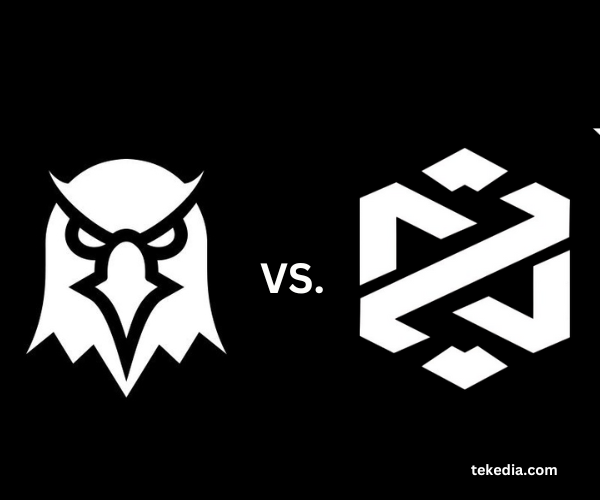
Decentralized finance (DeFi) is a major component of blockchain infrastructure. Given its open and advancing nature, traders and investors need to have a solid understanding of the market to minimize financial risks and properly manage their portfolios.
To achieve this, traders must perform due diligence using a variety of research tools to gain timely market insights. While there are many such tools available, this article will focus on Dex Screener and DexTools, highlighting their features and differences.
What Is Dex Screener, and What Does It Do?
Dex Screener is a DeFi analytics tool that provides real-time data from multiple decentralized exchanges (DEXs). It offers insights into trending tokens and tracks trading volume and liquidity across various token pairs on multiple blockchains. It aggregates token performance data from different decentralized exchanges and blockchain networks.
Register for Tekedia Mini-MBA edition 19 (Feb 9 – May 2, 2026): big discounts for early bird.
Tekedia AI in Business Masterclass opens registrations.
Join Tekedia Capital Syndicate and co-invest in great global startups.
Register for Tekedia AI Lab: From Technical Design to Deployment (next edition begins Jan 24 2026).
What are the Top Features of Dex Screener?
Dex Screener provides users with multiple insights to help analyze the DeFi market and ecosystem. Here are some of its features:
Blockchain Token Pairs: This feature covers multiple blockchains and their token pair performance. It displays real-time token transactions, top traders, holders, asset values, liquidity providers, and the percentage of burned tokens. Additionally, it includes bubble maps that track wallet interconnectedness and a real-time trading chart showing price, liquidity, Fully Diluted Valuation (FDV), market capitalization, transactions, volume, and unique wallets (makers).
Gainers and losers: This feature shows the highest and lowest-performing token pairs across multiple blockchains. It also allows users to view performance over different timeframes, ranging from 5 minutes up to the past 6 hours.
New Pairs: This feature shows new token pairs on the platform. It includes how long they’ve been listed, the buyers and sellers, trading volume, and liquidity.
Portfolio: This lets users track assets or follow someone else’s investment (usually smart money).
Multichart: This feature lets traders check the price performance of many decentralized (DEX) asset pairs across different chains at the same time. Instead of focusing on a single chart, they can view up to 16 charts at once.
Watchlist: Users can add their favorite pairs to the Watchlist and monitor price movement.
Alert: This feature sends real-time updates to traders about their favorite decentralized pairs.
What Is DexTools, and What Does It Do?
DexTools is a decentralized finance tool that gives traders real-time data to help analyze market trends. It offers token pair analysis, transaction history, performance tracking, safety scores, and educational resources to support decentralized trading and on-chain analysis.
Top Features of DexTools
Below are some of the core features of the DexTools platform:
DEX Explorer: This feature lets users search for different pairs, view live charts and transaction history, and see top traders, trading positions, and swaps.
Live New Pairs: This lets users see new token pairs across different blockchains. They can check the token price, time listed, initial liquidity date, token liquidity, pool amount, variation, and remaining pool price.
Safety Score: This feature lets users check the security strength of tokens, scored from 1 to 99.
Big Swap Explorer: Users can see the latest big swaps on several blockchains. They can view the swap time, quantity, total amount, variation, and wallet address.
Token Creator: This lets users create tradable tokens in minutes. The fee depends on the blockchain they use, such as Ethereum, Binance Chain (BNB), Polygon, Base, Arbitrum, Avalanche, Optimism, or Pulse.
MultiChart: This feature lets users view up to 10 charts of different pairs across blockchains at the same time.
Multiswap: Users can view and make multiple swaps across different chains.
DEXTstats: This lets users check trending pairs across several decentralized exchanges.
Wallet Info: This premium feature enables users to track specific wallet activities.
DX Fun: This feature lets users create tradable meme tokens instantly for less than $2. They can add a ticker symbol, token image, description, and social media links to make their token.
Simulator: Users can test-trade without investing real money.
DexTools Price Alert: This feature lets users set custom price levels for specific tokens. When the token’s price hits the chosen level, users receive a real-time alert, helping them stay on top of market movements without constantly watching the charts.
Dex Screener Vs. DexTools
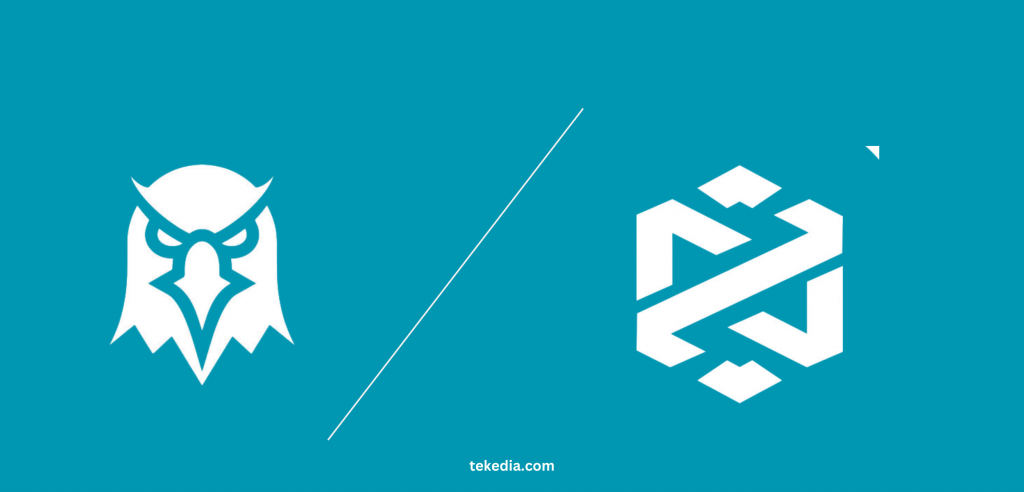
Both Dex Screener and DexTools give real-time insights to help users do due diligence before investing. However, their features are different. Below is a detailed comparison of the two platforms:
User Interface
Dex Screener and DexTools both have easy-to-use interfaces with strong design, making DeFi research engaging for users.
Both platforms focus on simplicity, accessibility, and a good user experience. Dex Screener has a more streamlined interface, while DexTools offers more features.
Mobile Accessibility
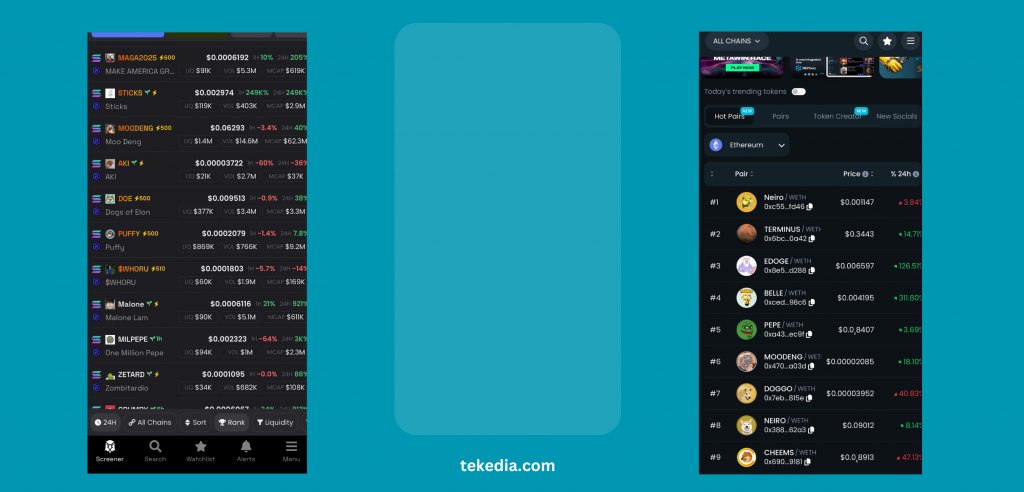
Both Dex Screener and DexTools are available on Android and iOS. The apps are user-friendly and equally accessible.
Charting Tools
Dex Screener and DexTools offer complete charting tools for traders to help analyze market trends. Both platforms show different timeframes, real-time charts, candlesticks, indicators, and many drawing tools powered by TradingView.
Data Analytic Tools
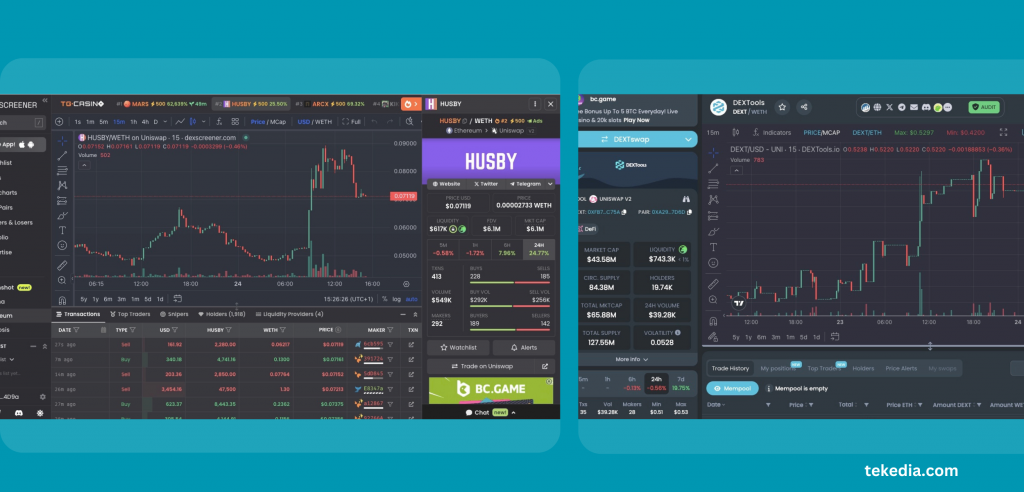
Both Dex Screener and DexTools provide real-time data across multiple blockchains. They help users track historical data, liquidity, token pairs, market depth, and token metrics. In terms of data analysis, both platforms are equally thorough and useful.
Pricing
DexTools offers many free trading and research features like an aggregator, price alerts, multichart, pair explorer, multiswap, and more. It also has extra features like a private group, position tracker, and wallet info that come with a monthly fee of 1,000 DEXT for the standard plan and 100,000 DEXT for the premium plan.
Although Dex Screener offers similar features, like multichart, live pairs, price alerts, pair explorer, and a wallet tracker for free, it doesn’t offer as many advanced features as DexTools.
For users seeking a completely free DeFi research and trading tool, Dex Screener excels in this area.
Community Features
Dex Screener and DexTools both build a sense of community on their platforms. Dex Screener has a live chat where users can react to price movements and talk to each other. DexTools offers a similar feature only on DX Fun, where users can respond to live prices of meme tokens.
Additionally, DexTools has a DEXT Force Private Group for its holders, which supports community engagement. It also offers the DEXT Community feature, where holders of 1,000 DEXT tokens or more can vote on project trust scores; however, this requires a paid subscription.
For users looking for a free option, Dex Screener is better at promoting community interaction without any cost.
Wallet Integration and dApp Compatibility
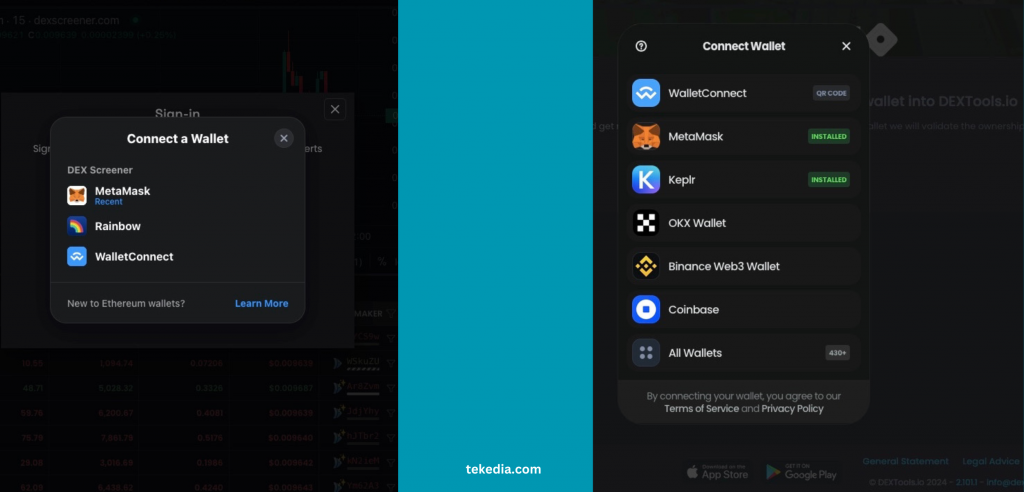
Dex Screener allows users to connect with three wallets: MetaMask, Rainbow Wallet, and WalletConnect, enabling access to various decentralized applications using a QR code.
DexTools, on the other hand, lets users connect through MetaMask, Kepl Wallet, Coinbase Wallet, WalletConnect, or over 430 wallet varieties.
While both Dex Screener and DexTools work with many wallets and dApps, DexTools stands out by supporting more wallets.
Portfolio Tracking
While Dex Screener lets users track various wallets for free, DexTools allows tracking up to 500 wallets, but only with a paid plan. So, Dex Screener is better for free wallet tracking. However, if you want to track smart money with more detailed portfolio info, DexTools might be the better choice.
Safety and Security
Both Dex Screener and DexTools let users sign a signature request before logging in. While neither platform guarantees 100% accuracy in their data, Dex Screener uses Bubblemaps to show wallet connections, while DexTools uses DEXTscore to rate project reliability.
Demo Trading
Dex Screener is solely a live-trading platform. DexTools, on the other hand, lets users test-trade using its Simulator feature before going live, which gives it an advantage in this area.
Educational Support
While both platforms address product concerns by providing relevant answers through their Frequently Asked Questions (FAQs), DexTools improves the learning experience with DEXT Academy, which offers educational resources on using DexTools and navigating the DeFi ecosystem. Therefore, DexTools is ahead in this aspect.
API Access
Both Dex Screener and DexTools let developers access data through APIs. However, Dex Screener offers free API access with Google Sheets integration, while DexTools requires a subscription for API keys. This makes Dex Screener the better option.
Token Listing
Neither Dex Screener nor DexTools allows token listings directly. Instead, they gather data from several blockchains when a token is added to a liquidity pool with at least one trade.
However, DexTools lets users create tokens and add liquidity, making them tradable across various dApps on the token’s blockchain. So, DexTools may be better for those who want to deploy and list their tokens on multiple dApps.
Multi-Language Support
Dex Screener is available in English, while DexTools supports nine languages: English, Chinese, Spanish, Russian, Arabic, French, Hindi, Turkish, and Portuguese. This gives DexTools an advantage in language support.
Bottom Line
Dex Screener and DexTools are both important tools for DeFi data tracking across different dApps. They have similar features but also unique strengths.
Depending on your needs and budget, either platform is good for token tracking and research.
Disclaimer!: This article is for educational purposes only and should not, in any manner, be interpreted as a piece of financial advice.




Brilliant writer and very informed. I’m your fan. Thanks for writing at Tekedia